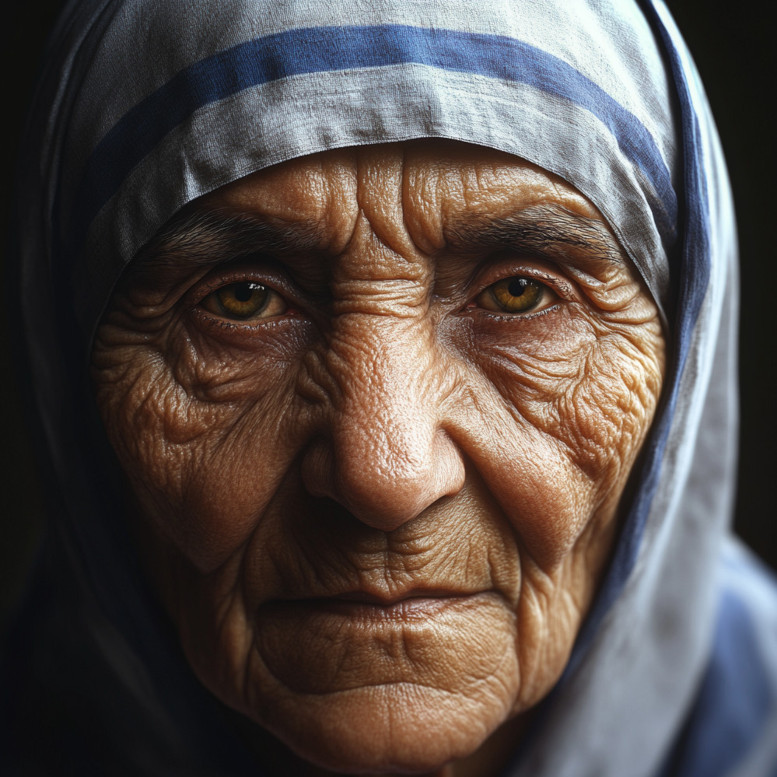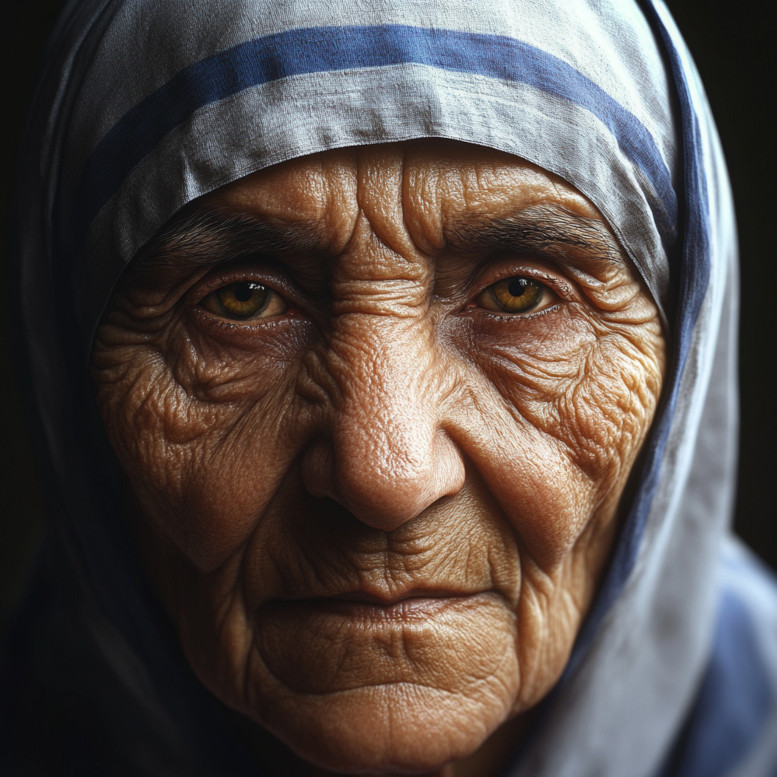


Mother Teresa (1910–1997), born Anjezë Gonxhe Bojaxhiu, was a Roman Catholic nun and missionary of Albanian-Indian descent who became one of the most beloved and revered figures of the 20th century. She is best known for her work in caring for the sick, poor, and dying in Calcutta (now Kolkata), India, where she founded the Missionaries of Charity, a religious congregation that has since spread worldwide. Mother Teresa's selfless dedication to serving the most vulnerable earned her numerous accolades, including the Nobel Peace Prize, and led to her canonization as a saint in the Roman Catholic Church.
Birth: Mother Teresa was born on August 26, 1910, in Skopje, which was then part of the Ottoman Empire and is now the capital of North Macedonia. She was the youngest of three children in a devoutly Catholic Albanian family.
Family and Upbringing: Her father, Nikola Bojaxhiu, was a successful businessman and community leader, and her mother, Dranafile Bojaxhiu, was known for her piety and charity. Her father's sudden death when she was eight years old left the family in financial difficulties, but her mother's deep faith and charitable actions profoundly influenced her.
Religious Calling: At the age of 18, feeling a strong call to religious life, Anjezë left her home to join the Sisters of Loreto, an Irish community of nuns with missions in India. She traveled to Dublin, Ireland, where she took her initial vows, and then moved to India, arriving in Calcutta in 1929.
Teaching in Calcutta: After taking her final vows in 1937, she became known as "Mother Teresa." She spent the next 20 years teaching at the Loreto convent school in Calcutta, where she eventually became the principal. During this time, she was deeply affected by the poverty and suffering she saw outside the convent walls.
The "Call Within a Call": In 1946, while traveling by train from Calcutta to the Himalayan foothills for a retreat, Mother Teresa experienced what she later described as the "call within a call." She felt a divine urging to leave the convent and live among the poor to help them directly. She described this as a call from Jesus to serve the "poorest of the poor."
Founding the Missionaries of Charity: In 1948, Mother Teresa received permission from the Vatican to leave the Sisters of Loreto and pursue her new calling. She donned a simple white sari with a blue border, which became the uniform of her new order, and began her work in the slums of Calcutta. In 1950, she founded the Missionaries of Charity, a congregation dedicated to serving the poorest and most vulnerable. The order focused on providing care for those who were sick, dying, orphaned, or abandoned.
Growth of the Order: Under Mother Teresa’s leadership, the Missionaries of Charity expanded rapidly, establishing homes, hospices, and orphanages across India and eventually worldwide. The order's work included caring for lepers, AIDS patients, refugees, and the homeless. By the time of her death in 1997, the Missionaries of Charity had more than 4,000 sisters running missions in over 130 countries.
Nirmal Hriday (Pure Heart): One of the most famous centers founded by Mother Teresa was the Nirmal Hriday (Kalighat Home for the Dying) in Calcutta. This hospice provided a place for the terminally ill to die with dignity, receiving care and love in their final days.
Nobel Peace Prize: In 1979, Mother Teresa was awarded the Nobel Peace Prize for her humanitarian work. She accepted the prize "in the name of the hungry, of the naked, of the homeless, of the blind, of all those who feel unwanted, unloved, uncared for throughout society, people that have become a burden to the society and are shunned by everyone." She used the prize money to further the work of the Missionaries of Charity.
Other Awards and Honors: Mother Teresa received numerous other awards and honors during her lifetime, including the Bharat Ratna (India’s highest civilian award) in 1980, the Order of Merit from the United Kingdom, and the Presidential Medal of Freedom from the United States. Her humility and dedication to service made her a globally respected figure.
Criticisms: Despite her widespread acclaim, Mother Teresa faced criticism from various quarters. Some critics questioned the quality of medical care provided in her facilities, arguing that they lacked proper medical standards. Others criticized her for promoting Catholic doctrine, particularly her opposition to contraception and abortion, even in the context of extreme poverty.
Response to Criticism: Mother Teresa remained largely unfazed by these criticisms, maintaining that her mission was to provide love and care for the poor, not to solve all the world's problems. Her focus was on offering dignity and comfort to those in the most desperate circumstances, guided by her deep faith.
Health and Final Years: In her later years, Mother Teresa struggled with health issues, including heart problems. Despite her declining health, she continued her work until March 13, 1997, when she stepped down as the head of the Missionaries of Charity. She passed away on September 5, 1997, in Calcutta, at the age of 87.
Canonization: After her death, the Vatican began the process of canonization, recognizing her as a saint in the Catholic Church. Pope John Paul II beatified her in 2003, bestowing upon her the title "Blessed Teresa of Calcutta." She was canonized as Saint Teresa of Calcutta by Pope Francis on September 4, 2016, in a ceremony attended by thousands, including many of her Missionaries of Charity.
Enduring Legacy: Mother Teresa’s legacy is enduring and far-reaching. She remains a symbol of compassion, selflessness, and dedication to the service of the poor and suffering. Her life and work continue to inspire millions around the world, and the Missionaries of Charity carry on her mission, serving those in need across the globe.
Cultural Impact: Mother Teresa’s influence extended beyond her immediate work, making her a cultural icon. Her life has been the subject of numerous books, documentaries, and films. She is often cited as an example of how one person's commitment to service can make a profound impact on the world.
Philosophy of Service: Mother Teresa’s philosophy of service was simple but powerful: "Not all of us can do great things. But we can do small things with great love." This message has resonated across religious and cultural boundaries, emphasizing the importance of compassion and kindness in everyday life.
Mother Teresa's life was a testament to the power of love and compassion in the face of suffering and poverty. Her unwavering commitment to the poorest of the poor, her deep faith, and her humble service have left an indelible mark on the world, making her one of the most revered figures in modern history.

We use cookies
We use cookies and other tracking technologies to improve your browsing experience on our website, to show you personalized content and targeted ads, to analyze our website traffic, and to understand where our visitors are coming from. Privacy Policy.